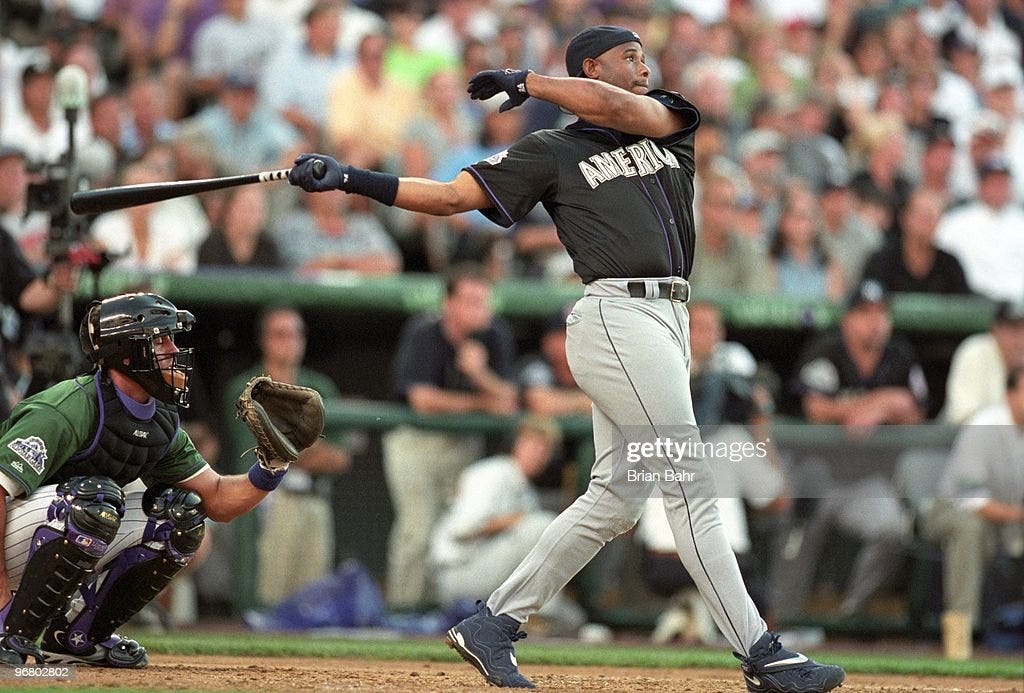
I wrote about the MLB All-Star Game last week, but it turns out I have a little more to say, particularly concerning the extracurriculars surrounding the game itself. As I mentioned in my previous post, these side attractions have long taken an outsized role in relation to NFL and NBA All-Star festivities, to the point that they’ve now even replaced the Pro Bowl altogether.
MLB’s Midsummer Classic is a little different, but not immune to such developments. There’s a Futures Game, which has grown a little in popularity in recent years, especially for fans of perennial loser teams who have nothing but prospects to pin their hopes on. And a Celebrity Softball Game that tends to feature stars from the entertainment world playing alongside the kind of ex-ballplayers who used to be recruited for Old Timers’ Games. They also have a Fan Fest.
None of these events are can’t miss television. But the one exception is the Home Run Derby.
Here’s the thing. We love dingers. Sure, we talk a lot about how we miss the more well-rounded game of baseball’s past, and I think most of us are sincere about that. Too much of any one thing is never good. But let’s be honest with ourselves. Neither the Steroid Era or our current analytics-driven product would have ever existed if we didn’t have an outsized love of home runs.
That’s okay. As fans, we’re not required to be perfect or devoid of the occasional hypocrisy. But the Home Run Derby is our yearly opportunity to push our reservations aside and unashamedly indulge our guilty pleasure.
The Home Run Derby began the same year as the PBN Era in 1985, but in typical MLB fashion, it wasn’t promoted very well for an embarrassingly long time. The Derby wasn’t even aired on same-day tape delay until 1993— the plan was to do it in 1988, but it was rained out in Cincinnati that year, so they decided to wait another five years. Makes sense, I guess? ESPN didn’t air it live until 1998.
This probably spared a lot of people from Chris Berman’s annoying play-by-play commentary, but it didn’t do the Derby any favors in terms of marketing. Side note: I reluctantly used a Berman catchphrase for the title of this post, because I feel like it’s appropriate, but on the whole, I find him incredibly annoying. The worst part of his schtick is that he clearly just looks at a map before each Derby so he can all out various suburbs on mammoth shots to pander to the locals. Fortunately, ESPN removed him as lead commentator a few years ago, but I believe he still headlines the radio broadcast.
Yet the Derby managed to catch on anyway, in spite of these obstacles and what often feels like the league’s own attempts to sabotage anything cool it accidentally creates. The ESPN coverage with Karl Ravech is still far from perfect. Take, for example, their fawning over Pete Alonso in 2021. Alonso is admittedly one of the best things to ever happen to the Derby and had just hit 35 HR in one round, but the entire crew gushed over him and completely ignored the show Salvador Perez was putting on in his own right. I am a Royals fan, and I might be looking at that with blue and white glasses, but it still feels like a slight two years later. Even so, I’ll still take Ravech over Berman.
In evaluating the Derby itself, as opposed to the coverage of it, the process gets a little trickier. Continuity is not the Derby’s strong suit. The rules have been tweaked or completely rewritten at least seven times in thirty-eight years. To give you an idea of the effect this can have, Dave Parker won the first Derby in 1985 with 6 HR. In 2019, Vladimir Guerrero Jr. hit 40 in one round. He finished with 91 total.
These totals should not make you think any less of Dave Parker, however. Not only is he a borderline Hall-of-Famer (despite what the WAR fanatics think), he’s arguably the coolest MFer to ever put on a baseball uniform. In this regard, it doesn’t hurt that he rose to fame wearing the extremely slick Pirates uniforms of the 70’s. Unfortunately, I didn’t really get to follow Parker until his time with Oakland near the end of his career, but by 1985 he had moved on to Cincinnati after getting sideways with the Pittsburgh fanbase and management.
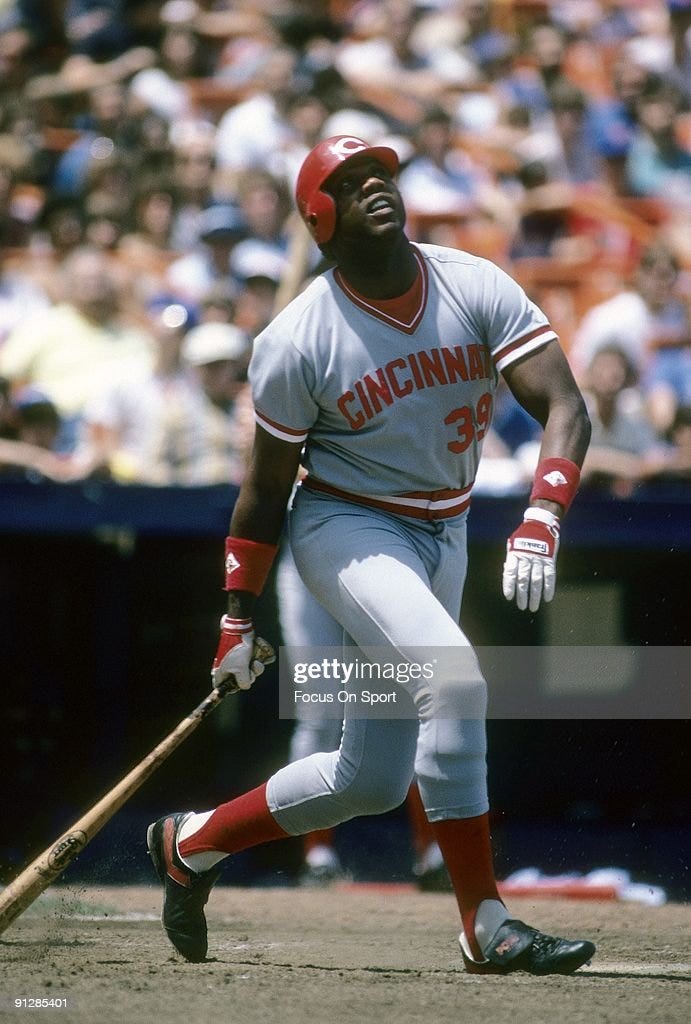
Unlike the NBA Dunk Contest, which regularly features a parade of no-names these days because the stars don’t want to participate, one of the Home Run Derby’s best features is its star power. Teams are sometimes hesitant to let their stars enter because there’s a long-standing urban legend that the Derby screws up players’ swings in the second half of the season, though there isn’t actually a lot of solid evidence to support this position. In fact, Parker used his success in the first Derby to spark a career turnaround and a successful second act. I mean, the guy used to swing a sledgehammer in the on-deck circle, so I don’t think he was worried about jacking up his mechanics.
Just to go a little further down this rabbit hole, the second Home Run Derby in 1986 resulted in co-champions. Daryl Strawberry and Angels 1B Wally Joyner shared the trophy by belting 4 whole home runs each. Strawberry was definitely the kind of player one could envision winning a slugfest, even if the total was a tad underwhelming, but Joyner is a bit of an outlier.
On the surface, it’s hard to come up with two more diametrically opposed players than Dave Parker (whose nickname was the Cobra) and Wally Joyner. A good 1B, who might have even been able to hang with the greats during his prime— unfortunately, by the time he played with the Royals from 1992-95, he was a little past that, though still a fine player— Joyner was kind of a dorky white guy known for being a fantastic defender and a great gap hitter, not a slugger. I mean, the guy’s a clean-cut Mormon who has produced several religious-themed films since his retirement. That’s about as far away from Dave Parker as I can imagine.
The funniest thing about Joyner is he was my cousin’s cousin’s favorite player. (You follow that? We weren’t related, but had a common cousin.) And Josh was one of the coolest kids I knew. He was partying and scoring chicks when I was still obsessing about things like Home Run Derbies, but he had a poster of Wally Joyner, of all guys, on his wall. Meanwhile, I was the one worshipping guys like Dave Parker. I guess it just goes to show you that we’re all fascinated by people who represent the unfamiliar. But I digress.
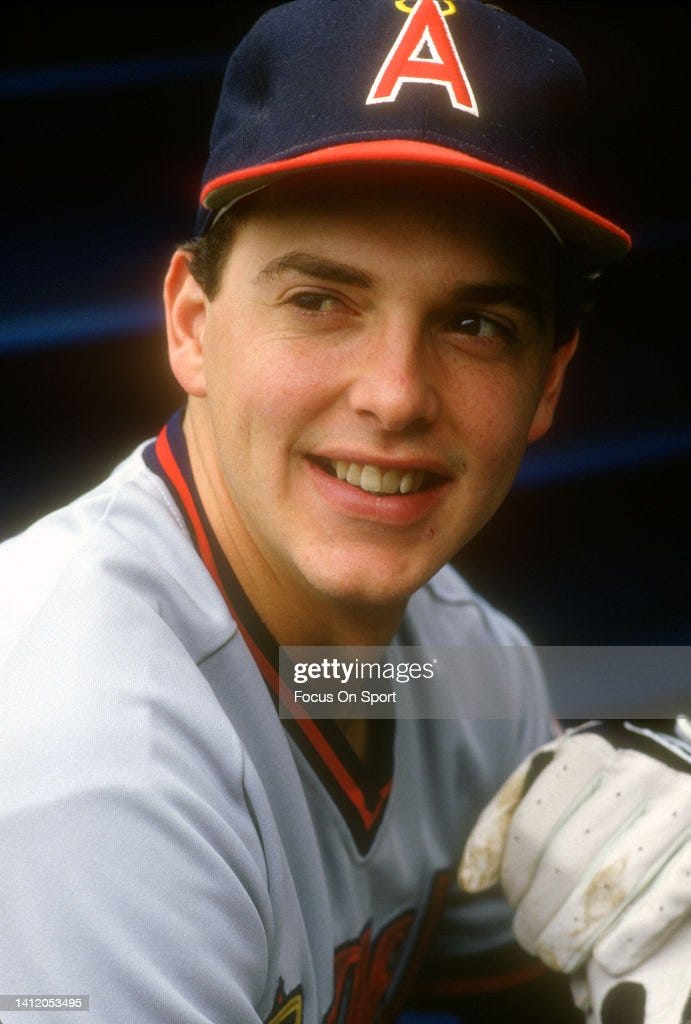
I’ll spare you the breakdown of all the rule changes. You can look them up yourself if you’re really interested, but regardless of the details, the Derby essentially boils down to one thing— the winner is whoever hits the most home runs. The number of attempts each player is allowed might change, and multi-round formats might not favor the person who hits the most total dingers, but the winner will always be the player who hits the most home runs when it counts.
Regardless of uniformity, this relatively simple concept has provided some dramatic moments over the years. One of my favorites was in 2008, when Josh Hamilton electrified the crowd at old Yankees Stadium by shattering the single round record of the format in use at that time by smacking 28 HR over the wall. To give you some context, the next highest total in any round was 9 by Justin Morneau. Ironically, Morneau went on to win the Derby by outdueling Hamilton 5-3 in the Final Round. Hamilton was the breakout star though.
Just this last season, Seattle rookie Julio Rodriguez captured the baseball world’s full attention by hitting 32 in the first round, on his way to unseating two-time defending champion Pete Alonso. Like Hamilton, however, he also lost the crown— in his case, to Juan Soto.
Gaudy totals are great, but they’re not required to create a memorable Derby moment. Sometimes you just need one jaw-dropping shot. Another Mariner, Ken Griffey Jr. provided this in 1993, when he became the first and only player ever (in the Derby or live action) to hit the B&O Warehouse across the street from Camden Yards in Baltimore.
Griffey is also the only three-time winner in Derby history. Three other players have won it twice: Pete Alonso (2019, 2021), Yoenis Cespedes (2013, 2014), and Prince Fielder (2009, 2012). Griffey won it in 1994, 1998, and 1999, but ’98 was his most memorable victory. He wasn’t even scheduled to participate. Seattle had played a late game the night before, and he declined to take part. Then the fans at Coors Field booed him during batting practice. Initially hurt by the reaction, Griffey talked it over with MLB legends Frank Robinson and Joe Morgan, and after an enthusiastic push from the fans, he relented and won the whole thing.
I’ve written before of how much I loved Mark McGwire as a kid, so it was a personal thrill for me when he took home the title in 1992. Heartbreak followed the next year when he was supplanted by Juan Gonzalez from the Texas Rangers. This was perhaps appropriate, considering that Gonzalez was then on his way to becoming the game’s premier slugger, earning AL MVP awards in 1996 and 1998.
I used to check the box scores in the paper every day to see if Mac or Gonzalez had homered the night before, then scan the league leaders to mark the progress in the AL Home Run race. Unless McGwire was hurt, their two names were inevitably at the top of the list every year of the early 90’s. Funnily enough, just as Gonzalez was winning his second MVP in 1998, Mac, now with the Cardinals, was reestablishing himself as the game’s marquee home run hitter by breaking Roger Maris’ single season record. Of course, we now know he had pharmaceutical assistance in that pursuit, but there’s a fair amount of circumstantial evidence that says Gonzalez was no boy scout in this regard either.
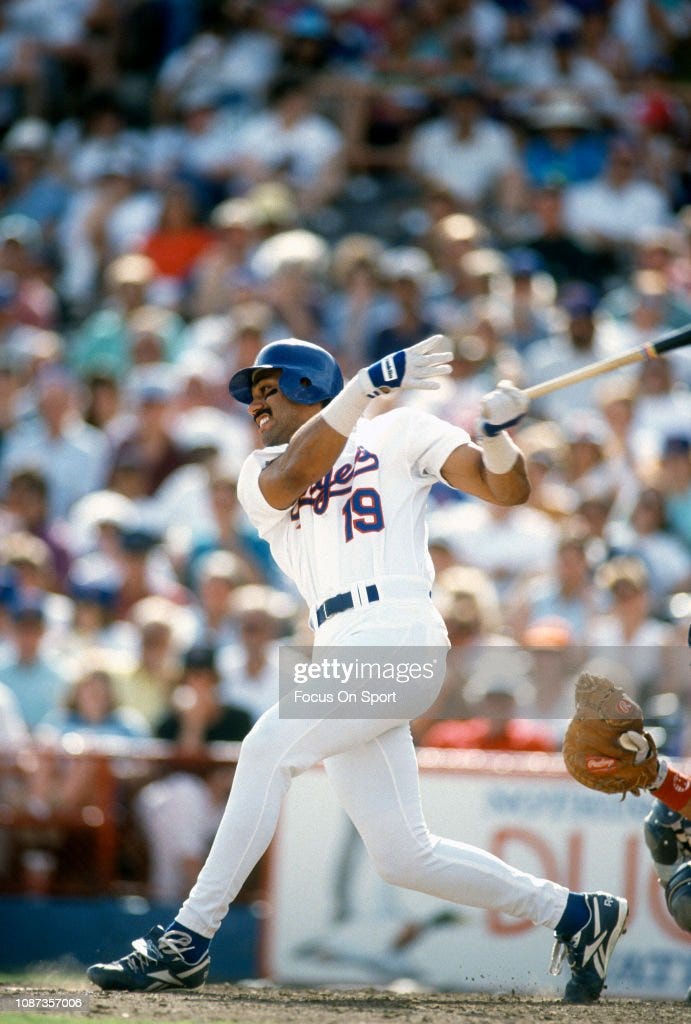
Like Joyner, Gonzalez also ended up in Kansas City later in his career, though he was even further past his prime. Like way further. His 2004 season at the K was far from memorable. But even with these failures in timing and ESPN’s flippant dismissal of Salvy in 2021, that doesn’t mean Kansas City hasn’t had its Home Run Derby moment.
It falls outside the PBN Era, but I think it’s worth noting. A renovated Kauffman Stadium hosted the All-Star Game in 2012. The team was a year away from contention, and two years away from going to back-to-back World Series, and was not without talent, though most of it was young and still fairly early in the big league development stage. The one exception to this was DH Billy Butler.
Nicknamed “Country Breakfast,” Butler never possessed the stereotypical physique of a professional athlete. On the burly side with a bit of a gut and little speed— his stolen base vs. the Angels in the 2014 ALDS is still a source of fascination to me— Butler could always hit. In 2012, he was selected as his team’s lone representative as they hosted the All-Star Game for the first time in nearly forty years
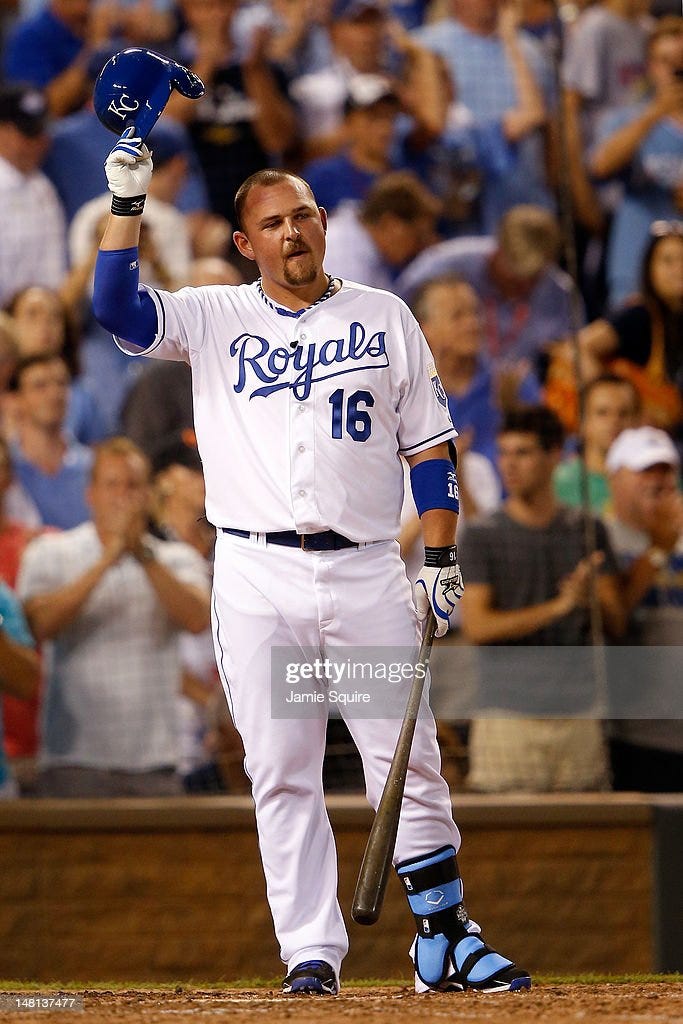
.Unlike many Royals’ ASG representatives over the years, which I mentioned in my previous post, Butler was actually deserving of the nod. 2012 was his best season, and he went on to win a Silver Slugger that year as well.
Butler’s 2012 stats: .313/.373/.510, 29 HR, 107 RBI, 32 Doubles, .882 OPS, 138 OPS+
The 29 home runs were a career high, and between that and the Derby taking place in his team’s park, he seemed like a natural pick to participate. American League captain and defending Derby champ, Robinson Cano (Yankees 2B), even echoed these rather obvious thoughts on ESPN in the weeks leading up to the ASG. At this point in the Derby’s history, each league had a captain who selected three other participants from their circuit to join them in the competition.
So what did Cano do when it was time to pick his team? He completely snubbed Butler, and effectively gave the middle finger to the hometown Kansas City fans. They responded in kind, booing him mercilessly during the Derby and the All-Star Game, while giving Butler a roaring, standing ovation when he was introduced before the game. It had to be one of the most amazing moments of Country Breakfast’s life.
As for the Derby? Cano looked rattled and didn’t hit a single home run, finishing in last place as Prince Fielder stole the show and took home his second championship. And for a few days that July, the once bitter rivalry between the Royals and Yankees was resurrected to a small degree. It wouldn’t last, for obvious reasons, but for the majority of the fans who were too young to remember when the baseball world revolved around a NY-KC axis (including myself), it was a cool spectacle to witness.
Cano proved that you don’t have to hit a single home run to be the main attraction of the Derby, a feat I’m sure he wishes he never accomplished.
Butler, on the other hand, proved that you don’t even have to be in the thing to win it.
Subscribing to Powder Blue Nostalgia is an easy home run. So make sure you’re knocking it out of the park and sign up for weekly emails delivering baseball history straight to your inbox. Thanks for reading, and don’t forget to leave your favorite Derby moments in the comments below.




Laughed at comment under Wally Joyner's photo. Nice article on HR Derby Patrick, keep up the good work!
#BooCano